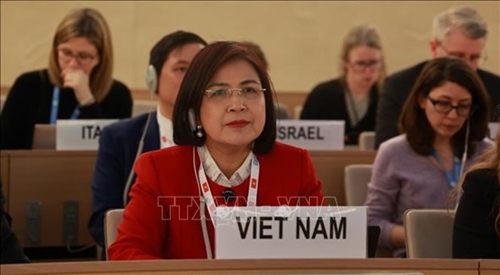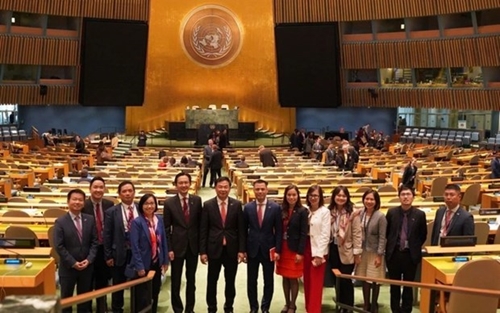In an interview granted to the Vietnam News Agency (VNA), Ambassador Le Thi Tuyet Mai, Head of the Permanent Mission of Vietnam to the United Nations (U.N.), WTO and other international organizations in Geneva, said the Vietnamese delegation, led by Deputy Prime Minister Tran Luu Quang, had actively participated the session since its beginning.
Speaking at a high-level session after the opening ceremony on February 27, Quang delivered strong messages about Vietnam's commitment, efforts, and achievements in national development and ensuring human rights. He called on countries to understand and respect each other's historical, political, cultural, and social characteristics, promote cooperation and dialogue, and approach human rights in a comprehensive manner, according to the ambassador.
    |
 |
|
Ambassador Le Thi Tuyet Mai, Head of the Permanent Mission of Vietnam to the United Nations (U.N.), WTO and other international organizations in Geneva. |
Notably, he put forward an initiative on celebrating the 75th anniversary of the Universal Declaration of Human Rights (UDHR) and the 30th anniversary of the Vienna Declaration and Program of Action (VDPA) with a document from the U.N. General Assembly, aiming to reaffirm and strengthen efforts and actions towards achieving the inclusive goals and values encompassed in the declarations and common international commitments to human rights for all, Mai said.
Following the high-level session, the Vietnamese delegation actively participated in the process of the record-long 52nd session, which lasted more than a month, with a huge workload.
The delegation joined discussions on about 80 reports and informal consultations on 43 draft thematic resolutions, along with meetings looking into the UPR reports of 14 countries and adopting decisions on the appointment of 10 personnel for special procedures.
According to Ambassador Mai, a highlight of Vietnam’s contribution was the initiative raised by Deputy PM Quang right at the beginning of the session on the UNHRC’s resolution on the celebrations of the 75th anniversary of UDHR and the 30th anniversary of VDPA.
On April 3, the UNHRC adopted the resolution by consensus, with 98 co-sponsoring countries recorded later on the day (Geneva time), including 14 co-authors - Vietnam, Austria, Bangladesh, Belgium, Bolivia, Brazil, Chile, Costa Rica, Fiji, India, Panama, Romania, South Africa and Spain, 34 UNHRC member states, western nations and many developing countries from the five regional groups, most of them from the Association of Southeast Asian Nations (ASEAN).
Apart from Quang’s speech at the high-level session and the above-said initiative, the Vietnamese delegation also contributed opinions in other sessions, such as discussions on ensuring the rights to housing, food, culture and development, children’s rights, and guaranteeing fair, equal and timely access to affordable COVID-19 vaccines for all countries, among others.
    |
 |
|
Vietnamese delegates to the UNHRC session |
In their remarks, the Vietnamese representatives emphasized the country's consistent stance, efforts, and achievements in promoting and protecting human rights, and affirmed Vietnam's commitment to sustainable development for the sake of its people.
They also stressed the need to address inequalities and protect vulnerable groups, called for the handling of global challenges like climate change, and affirmed Vietnam's commitment to enhancing constructive cooperation with countries, the Office of the U.N. High Commissioner for Human Rights (OHCHR), the UNHRC and its mechanisms in order to promote and protect human rights for all based on respect for the U.N. Charter and international human rights treaties, and to ensuring national sovereignty and the principles of objectivity, fairness, dialogue, construction, and cooperation.
Along with other ASEAN countries, the Vietnamese delegation also made remarks on issues of ASEAN’s concern, such as the right to development, technical cooperation, capacity building, and UPR.
Regarding climate change and human rights, which are priorities of Vietnam and other countries, Vietnam, Bangladesh and the Philippines - the Core Group on Human Rights and Climate Change, compiled and delivered a joint statement on climate change and human rights at this session, which attracted many co-sponsoring countries.
Moreover, Vietnam engaged in exchanges, contacts and consultations with other delegations, co-sponsored some initiatives in the spirit of cooperation and dialogue, and fulfilled its role as a member of the UNHRC in consulting and voting on 43 draft resolutions of the council.
Asked about Vietnam’s initiative on the UNHRC’s resolution on the commemoration of the 75th anniversary of UDHR and the 30th anniversary of VDPA, Mai said the document focuses on the importance of the two declarations, reiterating their main principles of human rights, reflecting countries’ wide interest in the commemoration, improving the position, role, and operational efficiency of the UNHRC and other human rights mechanisms of the U.N., emphasizing the leading role of countries in ensuring human rights, recognizing the participation of women, the role of international cooperation and unity, and respecting diversity and inclusiveness in promoting and protecting human rights in general and in joining the council’s work in particular.
The resolution also proposes the U.N. High Commissioner for Human Rights carry out commemorative activities, including a high-level U.N. event on human rights in December, and a report on the celebrations to be submitted to the 56th UNHRC session next year.
Mai called the resolution an outstanding hallmark created by Vietnam at the first session as a council member for 2023-2025, saying it demonstrates the country’s substantive, responsible contribution to the council’s affairs.
The Vietnamese permanent mission directly drafted, consulted, and negotiated the draft resolution after Deputy PM Quang proposed the initiative at the session.
Among the 43 resolutions adopted by the council, some have contentious contents to which many countries and groups of countries proposed adjustments, making them fail to be reached by consensus and forcing the council to conduct voting.
Therefore, the fact that the resolution proposed and drafted by Vietnam was adopted by consensus with the co-sponsorship of many countries demonstrates the document’s success in reflecting the common concern and priority of countries and international community, attracting the response and support of many countries, winning praise from parties.
Vietnam's proposal of this resolution is very timely, meeting the international community's interest in commemorating and promoting the UDHR and VDPA, the two important documents on human rights that form the basis of frameworks for international treaties, mechanisms, dialogues and cooperation at the international, regional and national levels on human rights.
The resolution is expected to further enhance efforts and actions of countries and the international community in realizing the goals, principles and commitments set forth in the two aforementioned documents, contributing to raising the role of the UNHRC and the U.N. High Commissioner for Human Rights in promoting and protecting human rights for all through dialogue and cooperation, and mutual respect and understanding.
This is also the result of efforts and innovation by the Ministry of Foreign Affairs and the Vietnamese mission in Geneva in proposing the initiative and drafting the resolution, as well as efforts of the Vietnamese delegation in directly consulting, mobilizing, and negotiating with other delegations to reach the consensus on the draft resolution whose content harmonizes concern of countries, in the context of countries and groups of countries showing different views on specific human rights issues.
In addition, Vietnamese representative offices abroad have also played a role in mobilizing the support of countries for the resolution, the ambassador said.
Vietnam's proposal, drafting, and negotiation of this resolution not only embodies its responsibility, efforts, and priorities as a UNHRC member for the 2023-2025 term, but also realizes the country’s foreign policy of actively, proactively and responsibly participating in addressing common concern of the international community.
Source: VNA